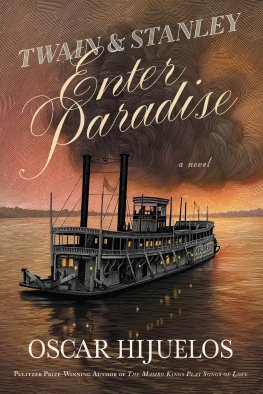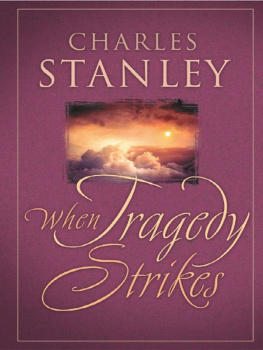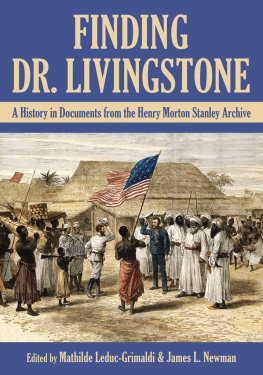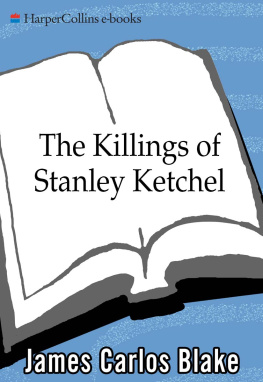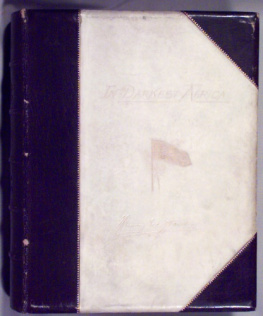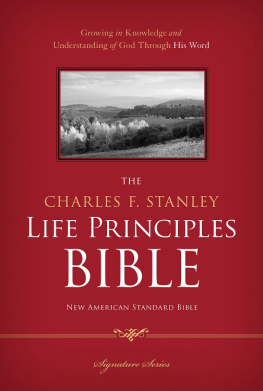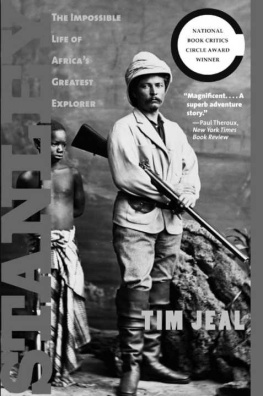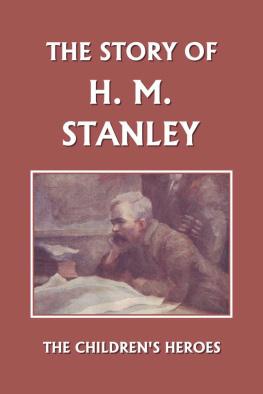Mr Stanley,
I P RESUME ?
The Life and
Explorations of
H ENRY M ORTON
S TANLEY

Alan Gallop

This book is dedicated to the memory of
Hazel Manson
who gave encouragement to everyone she met
and who loved a good story
Title-page: Henry Morton Stanley, from Leisure Hour,
25 January 1873.
First published in 2004 by Sutton Publishing
The History Press
The Mill, Brimscombe Port
Stroud, Gloucestershire, GL5 2QG
www.thehistorypress.co.uk
This ebook edition first published in 2013
All rights reserved
Alan Gallop, 2004, 2013
The right of Alan Gallop to be identified as the Author of this work has been asserted in accordance with the Copyrights, Designs and Patents Act 1988.
This ebook is copyright material and must not be copied, reproduced, transferred, distributed, leased, licensed or publicly performed or used in any way except as specifically permitted in writing by the publishers, as allowed under the terms and conditions under which it was purchased or as strictly permitted by applicable copyright law. Any unauthorised distribution or use of this text may be a direct infringement of the authors and publishers rights, and those responsible may be liable in law accordingly.
EPUB ISBN 978 0 7524 9494 4
Original typesetting by The History Press
CONTENTS
PREFACE
I n 2002 the BBC asked viewers and listeners to name 100 men and women from history and contemporary life whom they considered to be the Greatest Britons. Over thirty thousand people voted in the poll in which Sir Winston Churchill emerged as the figure the majority wanted as the top of their personality pops. Marie Stopes came in at 100th position; others nominated included Ernest Shackleton (11), Queen Elizabeth II (24), David Beckham (33), Captain Scott (54), Cliff Richard (56), J.R.R. Tolkien (92) and Dr David Livingstone (98).
Henry Morton Stanley (18411904) did not rate a mention. The man whom The Times identified on his death in 1904 as one of the greatest pioneer explorers and one of the most striking figures of the nineteenth century had been confined to historys B list during the last half of the twentieth century, making him an unsuitable candidate for inclusion in a table of the 100 most popular Britons. By 2002 there were insufficient numbers in Britain who were aware of Stanley and his achievements to vote him into their hall of fame.
The centenary of Stanleys death (in 2004) is a good time to reassess the life and accomplishments of this complex, controversial and most private of men; a man whose name will forever be associated with African exploration and the subsequent fever for colonisation of the land he named the dark continent. It was his direct and indirect achievements that resulted in Africas subdivision among European powers and inspired the Scramble for Africa.
For most of his life, Henry Morton Stanley attempted to conceal his true identity and background. When challenged with the truth, he lied. It was only in later years when he had mellowed in appearance and manner that he agreed to confront ghosts from his past and begin drafting his memoirs. Even then, Stanley often felt a need to be economical with the truth, embellish facts or fail to mention people and events if they threatened to get in the way of his story.
Stanley died before completing his memoirs and it was left to his widow, a sensitive and capable woman, to finish the job using her husbands unpublished journals and notes. By the time they appeared in 1909, shady figures from Stanleys earlier life had begun to re-emerge, suggesting to Lady Stanley that they possessed evidence damaging to her late husbands heroic reputation. Miraculously, each was in a position to part company with their evidence, written or otherwise providing Lady Stanley was prepared to buy the material and their silence. The possibility that her husbands reputation might be tarnished filled her with horror and she succumbed to the blackmail. As a result, Stanleys memoirs are heavily edited and names and identities of important characters and incidents are omitted.
Stanley set out to present an honest account of his life. The ageing former explorer stated:
There is no reason now for withholding the history of my early years, nothing to prevent my stating every fact about myself. I am now declining in vitality. My hard life in Africa, many fevers, many privations, much physical and mental suffering, bring me close to the period of infirmities.... Without fear of consequences, or danger to my pride and reserve, I can lay bare all circumstances which have attended me from the dawn of consciousness to this present period of indifference....
Who, then, was Henry Morton Stanley, the man who admitted: I was not sent into the world to be happy, nor to search for happiness. I was sent for special work? Why did he live his life as a lie, denying his true identity and the fact that he was a poor Welsh boy, born a bastard, brought up in a workhouse, and tell the world he was an American? Who was this soldier who fought on both sides during the Civil War, this roving newspaper correspondent on the American frontier, this adventurer who walked across Africa searching for an elderly and broken Scottish missionary and, when he found him, enquired: Dr Livingstone, I presume?
From what and from whom was he running when he marched from the Indian Ocean to the Atlantic to complete Livingstones work, follow the mighty Congo River to the sea and claim a slice of Africa the size of Western Europe for a land-hungry European monarch? And why was he prepared to lead a daring rescue mission to relieve a mysterious and reluctant colonial official and his people from annihilation in equatorial Africa?
Stanley made a broad and deep mark on his generation. One hundred years after his death is not only a good time to re-evaluate his life and achievements but also, perhaps, to rehabilitate his reputation in a fair and objective way. To do this, it is necessary to go back to his earliest beginnings....
Chapter 1
JOHN ROWLANDS BASTARD
T he ancient market town of Denbigh is one of the most historic in North Wales. Denbigh, or Denbych, derives its name from the Welsh language and means a fortified place. Fortifications take the form of a ruined thirteenth-century castle, built in 1282 for Edward I, that look down on the town and rich pastures of the Vale of Clwyd.
Visitors in the vicinity of the High Street pass the fifteenth-century timber-framed archway of the Golden Lion Inn, the sixteenth-century County Hall and narrow cobbled alleys before arriving in front of No. 7 Highgate, a medieval stone gabled building which towers above the rest of the street. A steep path leads to Burgess Tower and the entrance to King Edwards old walled town. Tower Hill passes St Hilarys Terraces and an unusual medieval house with battlements along the top and the castle gatehouse, from which an unpaved track leads to the site where a tiny cottage known as Castle Row once stood. It was demolished long ago, but was where one of the Victorian worlds most controversial figures is understood to have been born.
There is speculation that the baby baptised John Rowlands, Bastard, who in later life took the name of Henry Morton Stanley, may have been born in London. He wrote: One of the first things I remember is to have been gravely told that I had come from London in a band-box and to have been assured that all babies came from the same place. It satisfied my curiosity for several years as to the cause of my coming; but, later, I was informed that my mother had hastened to her parents from London to be delivered of me; and that, after recovery, she had gone back to the Metropolis, leaving me in the charge of my grandfather, Moses Parry, who lived within the precincts of Denbigh Castle.


